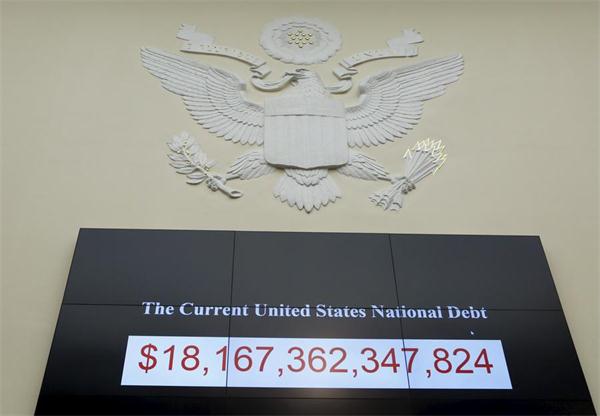 |
|
The current U.S. national debt is displayed before a House Financial Services committee hearing on "Monetary Policy and the State of the Economy" on Capitol Hill in Washington July 15, 2015. [Photo/Agencies] |
After former Florida governor Jeb Bush said last month that he would make achieving 4 percent economic growth his top goal if elected US president, Democratic presidential front-runner Hillary Rodham Clinton said on Monday that she would build a "growth and fairness economy" if elected to the White House.
The two presidential candidates should be applauded for trying to re-ignite the world's largest economy. But taking concrete steps to boost the growth of the real economy is easier said than done.
At a time when the world economy is yet to step out of the long shadow cast by the 2008 global financial crisis, it is reassuring to see economic growth taking central stage at the start of the campaign for the 2016 presidential election.
Instead of serving as a powerful growth engine, the US economy contracted at the start of 2015, dragging down global economic growth to 2.2 percent, the lowest since the Great Recession of the last decade, according to the World Economic Outlook released by the International Monetary Fund last week. The IMF has now cut its forecast for this year's global growth to 3.3 percent, down from the 3.5 percent it projected in April. That would be the slowest pace of global growth since the world economy shrank slightly in the recession year 2009. Worse, the ongoing Greek debt crisis and the recent Chinese stock market crash leave little room for optimism over better global growth.
Given the difficulties in sustaining the fragile global recovery, however, Chinese policymakers have made clear their intention to boost domestic growth as much as possible.
With its economy worth just more than $10 trillion, China contributes about 30 percent to global economic growth, while the $17-trillion US economy's share is only about 10 percent. If the US takes on more responsibilities to boost global economic recovery in accordance with its status as the world's largest economy, it is highly likely that China and other countries will immensely benefit from increased investment and export opportunities. And this is precisely why the international community should listen carefully to the economic plans of the US presidential candidates.
After piling up such a huge amount of national debt and printing volumes of cheap money to prevent the situation from worsening further in wake of the global financial crisis, US policymakers and future leaders should have realized that, without a solid plan to pursue real economic growth, the growing woes of wealth disparity and stagnant wages will continue to disappoint the majority of American citizens.
As for the world economy, if the US economy keeps oscillating between unexpected contraction and meager growth, there is little chance that it will experience sustained recovery any time soon, not to mention the imminent threat an eventual increase in US interest rates poses to many emerging economies.
Therefore, it is hoped that US presidential candidates will take seriously their pledge to boost economic growth.
At first glance, the 4-percent growth promised by Jeb Bush will allow the US economy to emerge from the crater of deep debt and easy credit faster, and power the global recovery more strongly. Hillary Clinton's plan, on the other hand, seems to focus more on boosting wages to alleviate the plight of workers through milder economic growth.
The lack of details about their economic plans makes it hard and too early to judge which one is more viable. But one thing is certain, the presidential candidates should not talk about boosting the real economy just to get votes. If China's practice of planning and delivering long-term growth offers one lesson, it is this: Only a responsible and sincere leadership can guarantee the success of such growth plans for the benefit of the people, the country and the world economy.
The author is a senior writer with China Daily. zhuqiwen@chinadaily.com.cn

I’ve lived in China for quite a considerable time including my graduate school years, travelled and worked in a few cities and still choose my destination taking into consideration the density of smog or PM2.5 particulate matter in the region.